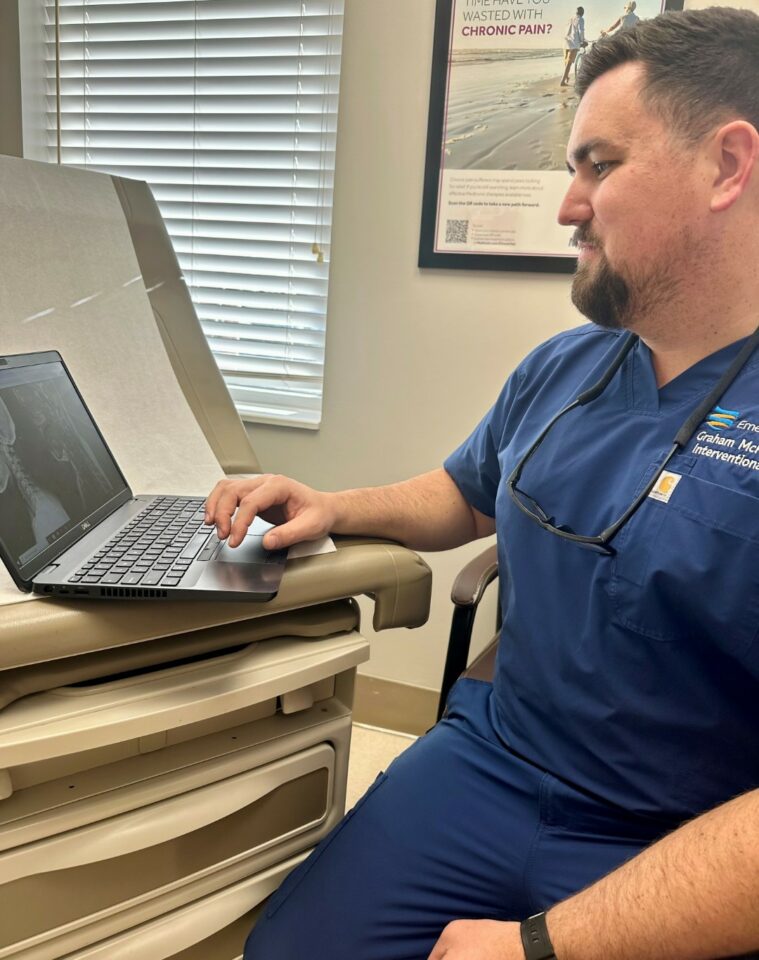
Trigger points are tight, knotted areas of tense muscle that cause myofascial pain syndrome. They are common in muscles that affect the neck and can be a source of chronic neck pain. A simple injection into these points can provide minimally invasive pain relief. If your ongoing pain has not responded to other therapies, your EmergeOrtho—Foothills Region orthopedic neck specialist might recommend trigger point injections.
What Causes Neck Pain?
 Chronic neck pain and tension headaches are common complaints and reasons people seek out physical therapy or orthopedic care. Typical causes of neck pain are injuries and general wear and tear on the spine, including osteoarthritis. Other sources of chronic neck pain include:
Chronic neck pain and tension headaches are common complaints and reasons people seek out physical therapy or orthopedic care. Typical causes of neck pain are injuries and general wear and tear on the spine, including osteoarthritis. Other sources of chronic neck pain include:
- Disc degeneration
- Herniated discs
- Pinched nerves
- Poor posture
- Spondylosis
If you engage in work or an activity that requires you to bend your head back toward the neck for long periods, this can also cause ongoing pain. Examples include cycling or painting ceilings.
About Trigger Points
Myofascial trigger points, or pressure points, are tight, contracted knots in muscle and fascial tissue surrounding muscles. They cause myofascial pain syndrome, which is a very common cause of pain and reduced range of motion in various parts of the body, including the neck.
You can often feel neck pressure points as lumps under the skin. They cause muscle pain and reduced range of motion, especially when touched or with pressure. Many of the common sources of neck pain cause trigger points. They often develop near a sprained or strained muscle after acute trauma. Poor posture, such as from sitting at a desk all day, can also contribute to the development of trigger points in the neck and back.
For some people, a myofascial trigger point responds to stretching and exercises, physical therapy, massage therapy, or heat therapy. Chronic trigger points that cause more significant pain might not resolve with these strategies. In these instances, trigger point injections are often the next step.
Trigger Point Treatments for Neck Pain
A trigger point injection is an injection of medication or saline solution into the tight area of the muscle to relax it and provide pain relief. Cervical trigger point injections target painful areas of the neck. Some of the pain medications and other substances physicians use during this procedure include:
- Saline: Saline is simply a saltwater solution. It can help the muscle relax.
- Local Anesthetic: An anesthetic, like a lidocaine injection, provides quick but temporary pain relief.
- Corticosteroids: This medication reduces any inflammation that might be causing or worsening pain. It is sometimes used along with an anesthetic to provide both quick and longer-term relief.
- Botulinum Toxin: Botox relaxes localized areas of the muscle to relieve pain.
A similar strategy to trigger point injections is called dry needling. This treatment uses thin needles without any medication or saline. Dry needling in the trigger point is often enough to release the knot.
Benefits of Trigger Point Injections
Studies show that an injection is one of the most effective ways to treat pain caused by myofascial knots. It can effectively release or inactivate the trigger point, releasing tension and sensitivity as well as reducing pain.
Each patient responds differently to the treatment. Some experience immediate pain relief, while others do not see the effects for a day or longer. Some people might not experience any benefits.
Trigger point injections are considered safe for most patients. The risks are low and are typically outweighed by the benefits. The most common side effects are bruising, tenderness, and soreness at the injection site, which resolve quickly.
Only rarely does this treatment cause more serious complications, including infection, excessive bleeding, or vascular injury.
When Should I Consider a Trigger Point Injection for Neck Pain?
If you catch a trigger point as it just begins to develop, you can probably manage it with physical therapy, associated exercises, and stretching. If the trigger points are chronic, have been causing pain for a long time, and do not respond to other treatments, you could be a good candidate for a trigger point injection.
If you are dealing with ongoing neck pain, our EmergeOrtho—Foothills Region spine, back, and neck specialists, pain management providers, and physical therapists can help. Call (828) 672-1299 or schedule an appointment today.






